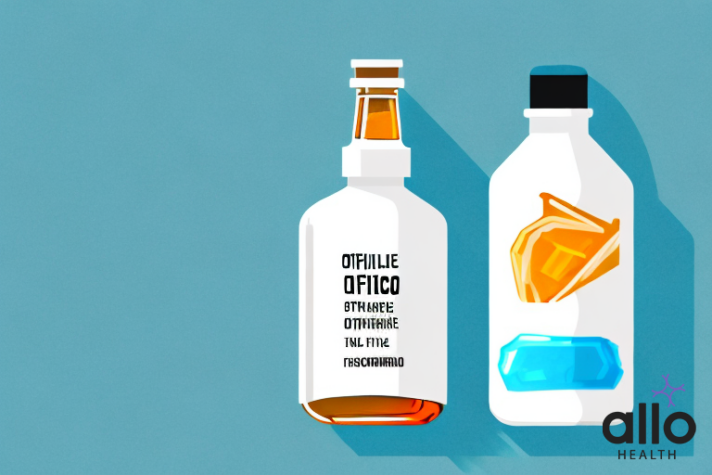Uses Of Ofloxacin And Ornidazole Syrup

Allo Health is dedicated to personalized well-being, offering support and trusted information tailored to individual health goals. The platform emphasizes human-generated content, led by a distinguished medical team of experts, including physicians and sexual health specialists. Their commitment to credibility involves rigorous fact-checking, authoritative research, and continuous updates to ensure accurate, up-to-date information. Allo Health's unique approach goes beyond conventional platforms, providing expert-led insights and a continuous commitment to excellence, with user feedback playing a crucial role in shaping the platform's authoritative voice.

Dr Sanina Mansoor holds MBBS degree from Yenepoya university,Mangalore.She has 8 years of experience working as a medical officer at various health centres and medical colleges.
Why This Was Upated?
Our experts continually monitor the health and wellness space, and we update our articles when new information became available.
Updated on 18 December, 2023
- Article was updated as part of our commitment to diversity, equity, and inclusion.

"The following blog article provides general information and insights on various topics. However, it is important to note that the information presented is not intended as professional advice in any specific field or area. The content of this blog is for general educational and informational purposes only.
Book consultation
The content should not be interpreted as endorsement, recommendation, or guarantee of any product, service, or information mentioned. Readers are solely responsible for the decisions and actions they take based on the information provided in this blog. It is essential to exercise individual judgment, critical thinking, and personal responsibility when applying or implementing any information or suggestions discussed in the blog."
If you’re dealing with an infection, you might have heard of Ofloxacin and Ornidazole Syrup. This combination of antibiotics can effectively treat various bacterial infections.
What Is Ofloxacin and Ornidazole Syrup?
Ofloxacin and Ornidazole Syrup is a medication that combines two active ingredients, ofloxacin and ornidazole, in the form of a liquid syrup. Let’s delve into the details of these components and the purpose of the combination:
Ofloxacin
Ofloxacin is a broad-spectrum antibiotic belonging to the fluoroquinolone class. It is used to treat a wide range of bacterial infections by inhibiting the growth and reproduction of bacteria. Ofloxacin works by targeting and inhibiting enzymes called DNA gyrase and topoisomerase IV, which are crucial for bacterial DNA replication and repair. This disruption in DNA processes ultimately leads to the death of the bacteria.
Common uses of ofloxacin include treating infections of the respiratory tract (such as bronchitis, pneumonia), urinary tract, skin, and soft tissues. It can also be prescribed to manage sexually transmitted infections and certain types of bacterial diarrhea.
Ornidazole
Ornidazole is an antimicrobial agent that belongs to the nitroimidazole class. It is primarily used to treat infections caused by protozoa and anaerobic bacteria. Ornidazole exerts its antimicrobial effect by interfering with the DNA synthesis and replication processes within the microorganisms. It is especially effective against parasites and anaerobic bacteria that thrive in environments devoid of oxygen.
Ornidazole is often prescribed to treat infections like amoebiasis (caused by the parasite Entamoeba histolytica), giardiasis (caused by the parasite Giardia lamblia), trichomoniasis (a sexually transmitted infection caused by the protozoan Trichomonas vaginalis), and certain types of infections in the gastrointestinal tract.
Combination of Ofloxacin and Ornidazole
The combination of ofloxacin and ornidazole in a single syrup is particularly useful in treating mixed infections where both bacterial and protozoal causes are suspected. By combining these two medications, a broader spectrum of pathogens can be targeted effectively. The combination is commonly used in conditions such as:
- Mixed infections in the gastrointestinal tract.
- Infections caused by both bacteria and parasites.
- Infections in which the precise causative agent is unknown, and a broad-spectrum treatment is required.
The use of this combination syrup should be under the supervision and prescription of a qualified medical professional. Dosage, duration of treatment, and potential interactions with other medications should be carefully considered based on the patient’s specific medical condition.
As with any medication, there can be potential side effects and contraindications. Common side effects of this combination syrup might include gastrointestinal disturbances, allergic reactions, and neurological effects. Patients with a history of hypersensitivity to either ofloxacin or ornidazole, as well as those with certain neurological disorders, should exercise caution or avoid this medication.
Always consult a healthcare provider before starting or stopping any medication and to discuss any potential risks or benefits associated with Ofloxacin and Ornidazole Syrup based on your individual health situation.
Indications For Using Ofloxacin and Ornidazole Syrup
Ofloxacin and Ornidazole syrup is a combination medication that contains two active ingredients: ofloxacin and ornidazole. It is commonly used to treat a variety of bacterial and protozoal infections. Below are detailed indications for using Ofloxacin and Ornidazole syrup:
Bacterial Infections
- Urinary Tract Infections (UTIs): Ofloxacin, a fluoroquinolone antibiotic, is effective against many types of bacteria that cause urinary tract infections, including Escherichia coli, Klebsiella, and Proteus species.
- Respiratory Tract Infections: This medication can be prescribed for respiratory infections like bronchitis and pneumonia caused by susceptible bacteria.
- Skin and Soft Tissue Infections: Ofloxacin is used to treat bacterial skin infections, such as cellulitis, impetigo, and wound infections.
- Gastrointestinal Infections: Infections affecting the gastrointestinal tract, such as traveler’s diarrhea, can be treated with this medication.
Protozoal Infections
- Amoebiasis: Ornidazole, a nitroimidazole antibiotic, is effective against protozoa like Entamoeba histolytica, which causes amoebiasis. This infection typically affects the intestines and can lead to symptoms like diarrhea, abdominal pain, and fever.
- Giardiasis: Ornidazole is also used to treat giardiasis, an infection caused by the parasite Giardia lamblia. This infection commonly leads to diarrhea, abdominal cramps, and bloating.
Mixed Infections
- Mixed Infections: When a patient presents with a combination of bacterial and protozoal infections, this combination medication can provide broad-spectrum coverage and effectively address both types of pathogens.
Dental Infections
- Dental Infections: Ofloxacin and Ornidazole syrup can be used to treat infections that involve the oral cavity, such as gum infections (gingivitis) or dental abscesses.
Gynecological Infections
- Gynecological Infections: This medication may be prescribed for certain gynecological infections caused by bacteria or protozoa.
Sexually Transmitted Infections
- Sexually Transmitted Infections (STIs): In some cases, this medication may be used to treat STIs caused by susceptible bacteria or protozoa.
This medication should only be used under the supervision and prescription of a qualified medical professional. The dosage and duration of treatment will depend on the specific condition being treated, the patient’s medical history, and other factors. As with any medication, Ofloxacin and Ornidazole syrup can have potential side effects and interactions with other drugs, so it’s crucial to follow the healthcare provider’s instructions and report any adverse reactions promptly.
Dosage And Administration of Ofloxacin and Ornidazole Syrup
The dosage and administration of Ofloxacin and Ornidazole syrup can vary based on the patient’s age, weight, the severity of the infection, and other individual factors. It’s important to follow your healthcare provider’s instructions and the information provided on the medication packaging. Below is a general guideline for the dosage and administration of this syrup:
Dosage
- The usual dosage of Ofloxacin and Ornidazole syrup may vary, but a common adult dosage is around 5 ml to 10 ml (approximately 1 to 2 teaspoons) taken two times a day.
- For pediatric patients (children), the dosage is often determined based on body weight. The recommended dose for children is typically around 2.5 ml to 5 ml (about half to 1 teaspoon) two times a day.
Administration
- The syrup should be taken orally, preferably with food to minimize stomach upset.
- Use a measuring spoon or a calibrated dropper to ensure accurate dosing. Do not use household utensils as they may not provide accurate measurements.
- Shake the bottle well before each use to ensure that the contents are evenly mixed.
- Follow the prescribed schedule strictly. Do not skip doses and complete the full course of treatment even if you start feeling better.
- If you miss a dose, take it as soon as you remember. If it’s close to the time for the next dose, skip the missed dose and continue with the regular dosing schedule. Do not take a double dose to make up for a missed one.
Duration of Treatment
- The duration of treatment with Ofloxacin and Ornidazole syrup can vary based on the specific infection being treated. Typically, the treatment duration can range from a few days to a couple of weeks.
- It’s essential to complete the entire course of treatment as prescribed by your healthcare provider, even if your symptoms improve before the medication is finished. Incomplete treatment can lead to the development of antibiotic resistance or recurrence of the infection.
Side effects Of Ofloxacin and Ornidazole Syrup
Ofloxacin and Ornidazole syrup, like all medications, can have potential side effects. Not everyone will experience these side effects, and their severity can vary. It’s important to be aware of the possible side effects and to promptly report any adverse reactions to your healthcare provider. Below are some of the potential side effects associated with Ofloxacin and Ornidazole syrup:
Common Side Effects
- Nausea: Feeling queasy or having an urge to vomit.
- Vomiting: The act of expelling stomach contents through the mouth.
- Diarrhea: Passage of loose, watery stools.
- Headache: Aching or pain in the head.
- Dizziness: Feeling unsteady or lightheaded.
- Abdominal Pain: Discomfort or pain in the abdomen (belly).
- Changes in Taste: An altered sense of taste or a metallic taste in the mouth.
Less Common Side Effects
- Skin Rash: Abnormal changes in the skin’s appearance or texture.
- Itching: An uncomfortable sensation that prompts scratching.
- Fatigue: Feeling tired, lacking energy, or being easily exhausted.
- Sleep Disturbances: Trouble sleeping or changes in sleep patterns.
- Nervousness: Feelings of restlessness or unease.
Serious Side Effects (Less Common, but Important to Monitor)
- Allergic Reactions: These may include hives, difficulty breathing, swelling of the face, lips, tongue, or throat. Severe allergic reactions are rare but require immediate medical attention.
- Joint Pain or Swelling: Pain, swelling, or discomfort in the joints.
- Tendon Rupture: A rare but severe side effect, especially in patients over 60 years old, involving the tearing of tendons.
- Central Nervous System Effects: Rarely, the medication might cause confusion, hallucinations, depression, or other changes in mental state.
Precautions For Ofloxacin and Ornidazole Syrup
Taking precautions when using Ofloxacin and Ornidazole syrup is essential to ensure the medication’s effectiveness and to minimize the risk of side effects. Here are detailed precautions to consider:
Medical History:
- Inform your healthcare provider about your complete medical history, including any allergies, past reactions to medications, and any existing health conditions, such as kidney concerns, liver disease, neurological disorders, or heart conditions.
Allergies:
- If you have a known allergy to ofloxacin, ornidazole, or any other quinolone antibiotics or nitroimidazole drugs, you should not take this medication. Be sure to communicate any allergies to your healthcare provider.
Pregnancy and Breastfeeding:
- If you are pregnant, planning to become pregnant, or breastfeeding, consult your healthcare provider before using this medication. The safety of this combination medication during pregnancy and breastfeeding is not fully established, and your doctor will weigh the benefits against the potential risks.
Drug Interactions:
- Notify your healthcare provider about all the medications, supplements, and herbal products you are taking, as some drugs can interact with Ofloxacin and Ornidazole syrup. Certain interactions can lead to reduced effectiveness, increased side effects, or potential adverse reactions.
Central Nervous System Effects:
- Ofloxacin can sometimes cause dizziness, confusion, or other central nervous system effects. Be cautious when operating machinery, driving, or engaging in activities that require alertness until you know how the medication affects you.
Tendon Rupture:
- There is a rare risk of tendon rupture, particularly in patients over 60 years of age. If you experience pain, swelling, or discomfort in your tendons, especially in the Achilles tendon area, contact your healthcare provider immediately.
Avoid Alcohol:
- Avoid consuming alcohol while taking this medication, as it can increase the risk of side effects and may interfere with the medication’s effectiveness.
Blood Sugar Levels:
- If you have diabetes, closely monitor your blood sugar levels while taking this medication, as it can potentially affect glucose control.
Photosensitivity:
- Some individuals may become more sensitive to sunlight or UV rays while taking Ofloxacin. Protect your skin from excessive sun exposure and consider using sunscreen and protective clothing.
Antibiotic Resistance:
- Finish the entire course of treatment as prescribed by your healthcare provider, even if your symptoms improve before the medication is finished. Incomplete treatment can contribute to the development of antibiotic-resistant bacteria.
Children and Adolescents:
- Ofloxacin is generally not recommended for children and adolescents under 18 years of age due to potential effects on developing bones and joints.
Contraindications of Ofloxacin and Ornidazole Syrup
Contraindications are specific situations or conditions where the use of a medication is not recommended or is potentially harmful due to the risk of severe adverse effects. Here are detailed contraindications for Ofloxacin and Ornidazole syrup:
Hypersensitivity:
- If you have a known hypersensitivity or allergy to ofloxacin, ornidazole, other quinolone antibiotics, or nitroimidazole drugs, you should not take Ofloxacin and Ornidazole syrup. Hypersensitivity reactions can range from mild rashes to severe allergic reactions that may involve difficulty breathing, swelling of the face, lips, tongue, or throat.
Children and Adolescents:
- Ofloxacin is generally contraindicated in children and adolescents under 18 years of age due to its potential adverse effects on growing bones and joints. The use of quinolone antibiotics like ofloxacin in this age group can lead to musculoskeletal disorders.
Pregnancy and Breastfeeding:
- This combination medication is not recommended during pregnancy, especially in the first trimester, due to potential risks to the developing fetus. Additionally, the safety of ornidazole during pregnancy has not been fully established. The use of Ofloxacin and Ornidazole syrup while breastfeeding should also be avoided, as both ofloxacin and ornidazole can be excreted in breast milk.
Myasthenia Gravis:
- Myasthenia gravis is a neuromuscular disorder that can be exacerbated by quinolone antibiotics like ofloxacin, potentially leading to severe muscle weakness and respiratory compromise. Therefore, this medication is generally contraindicated in individuals with known or suspected myasthenia gravis.
Seizure Disorders:
- Quinolone antibiotics like ofloxacin have been associated with an increased risk of seizures. Individuals with a history of epilepsy or seizure disorders should avoid using Ofloxacin and Ornidazole syrup, as it may lower the seizure threshold.
Peripheral Neuropathy:
- Peripheral neuropathy involves damage to the peripheral nerves and can be exacerbated by quinolone antibiotics. Individuals with a history of peripheral neuropathy should avoid using this medication.
Organic Neurological Disorders:
- Ofloxacin and Ornidazole syrup should be used with caution or avoided in individuals with organic neurological disorders, as it may exacerbate these conditions.
Blood Disorders:
- If you have a history of blood disorders, including low white blood cell count (neutropenia) or low platelet count (thrombocytopenia), the use of this medication may be contraindicated.
G6PD Deficiency:
- Individuals with glucose-6-phosphate dehydrogenase (G6PD) deficiency should avoid using Ofloxacin and Ornidazole syrup, as it can potentially trigger hemolytic anemia, a condition in which red blood cells are destroyed faster than they can be produced.
Frequently Asked Questions
(1) What is Ofloxacin and Ornidazole Syrup used for?
Ofloxacin and Ornidazole Syrup is a medication used to treat a variety of bacterial infections, such as urinary tract infections and respiratory tract infections. It’s also effective against certain protozoal infections like amoebiasis and giardiasis.
(2) How does the combination of Ofloxacin and Ornidazole work?
Ofloxacin is an antibiotic that fights bacteria by inhibiting their growth, while Ornidazole is an antibiotic that combats certain protozoa. Together, they provide a broad-spectrum treatment for mixed infections.
(3) Can I take Ofloxacin and Ornidazole Syrup during pregnancy?
The use of this syrup during pregnancy is generally not recommended, especially in the first trimester, due to potential risks to the developing fetus. Consult your healthcare provider before using this medication if you’re pregnant or planning to become pregnant.
(4) Are there any side effects of Ofloxacin and Ornidazole Syrup?
Common side effects include nausea, vomiting, diarrhea, and headache. Less common side effects may include skin rash, itching, and fatigue. Serious side effects like allergic reactions and joint pain are rare but possible.
(5) Can I drink alcohol while taking this medication?
No, it’s best to avoid alcohol while taking Ofloxacin and Ornidazole Syrup. Alcohol can interact with the medication, potentially leading to adverse effects and reduced treatment effectiveness.
(6) Can children take Ofloxacin and Ornidazole Syrup?
The syrup is generally not recommended for children and adolescents under 18 years of age due to potential effects on growing bones and joints.
(7) How do I take Ofloxacin and Ornidazole Syrup?
Take the syrup orally with food to minimize stomach upset. Use a calibrated dropper or measuring spoon for accurate dosing. Complete the prescribed course even if symptoms improve.
(8) Can I drive or operate machinery while taking this medication?
Be cautious, as Ofloxacin can cause dizziness and confusion in some individuals. If you experience these effects, avoid activities that require mental alertness.
(9) What should I do if I miss a dose?
If you miss a dose, take it as soon as you remember. If it’s close to the next dose, skip the missed dose and continue with the regular schedule. Do not double dose.
(10) How long should I take this medication?
The duration of treatment varies based on the infection. Finish the entire course prescribed by your healthcare provider to prevent recurrence and antibiotic resistance.
(11) Can I take Ofloxacin and Ornidazole Syrup if I have a history of seizures?
Individuals with a history of seizure disorders should avoid this medication, as it may lower the seizure threshold and increase the risk of seizures.
(12) What should I do if I experience severe side effects?
If you experience severe side effects, such as difficulty breathing, swelling, or severe joint pain, seek medical attention immediately.
(13) Can I take this medication if I have diabetes?
If you have diabetes, closely monitor your blood sugar levels while taking this medication, as it can potentially affect glucose control.
(14) Is it safe to breastfeed while taking Ofloxacin and Ornidazole Syrup?
Breastfeeding while using this medication is generally not recommended, as both ofloxacin and ornidazole can be excreted in breast milk.
(15) Can I stop taking the medication once my symptoms improve?
No, it’s important to complete the full course of treatment as prescribed by your healthcare provider to ensure the infection is fully treated and to prevent antibiotic resistance.






































